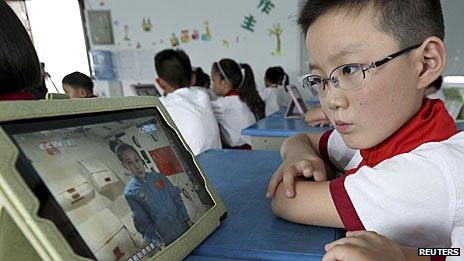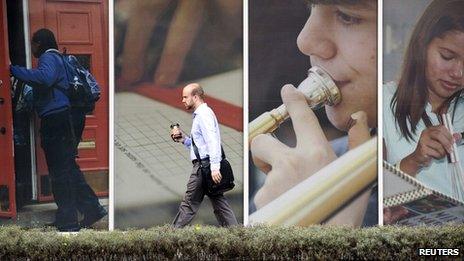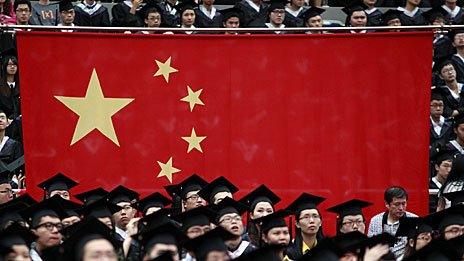How Pisa became the world's most important exam
- Published

Rising star: Chinese pupil in lesson taught live from space by a Chinese astronaut
"Your education today is your economy tomorrow," says Andreas Schleicher from the Organisation for Economic Co-operation and Development, who has become one of the world's most influential figures in education.
And next week, the state of today's education standards across the developed world will be revealed with the publication of the results of the OECD's Programme for International Student Assessment, better known as the "Pisa tests".
This mammoth, three-yearly exercise, will produce international education rankings for more than 60 countries and dozens of regional administrations, based on tests in reading, maths and science taken by more than 500,000 15-year-olds.
And in the future it could get even bigger, with Mr Schleicher saying he wants to develop OECD rankings for universities.
Global league table
This latest world cup of school standards will reveal whether the Asian school systems, such as in Shanghai in China, Singapore and South Korea, remain world-beaters.

Mother meets son after exam: Shanghai was top performer in the 2009 Pisa tests
And will the old Western powers, such as the US, the UK and France, remain stuck in the "must do better" category of this global classroom?
But what's the point of this vast piece of number crunching?
Mr Schleicher, now courted and quoted by education ministers, says the idea began in the 1990s with the simple recognition that governments were being compared on how much cash they were spending on education, rather than levels of achievement.
It was all about what was going in and nothing about what was coming out.
So the idea was launched for pupils in different countries to take pen and paper tests in core subjects and see how they compared.
And the name Pisa was chosen, not for any link to the Italian city, but because it was an acronym that was spelt the same in English and French.
Pisa topping
Mr Schleicher says that in a globalised world the key comparisons are with other countries - and this is true for education as much as economics.

Andreas Schleicher wants to extend OECD rankings to higher education
"Your country's competitiveness and your individual job prospects are heavily influenced by what happens in other countries," he says.
"In a global economy improvement by national standards is not a measure of success. You compete globally."
Only relying on national exams, where the grades seem to keep improving, is a dishonest disservice to young people, he argues.
"It's like telling a disadvantaged student in your classroom, 'It doesn't matter how you compare with people in other schools, I'll give you a good mark because you're doing the best you can.'
"That's very nice, but once the student gets out into the labour market they're going to feel the brunt of reality."
"It is very important to know how well our students are prepared for a global economy."
Bringing bad news
This hasn't always made Pisa many friends. It can puncture the idea that everything is getting better.
The first victim of "Pisa shock" was Mr Schleicher's own country, Germany, a country that had nurtured a self-image of a high-performing education system.

The US Department of Education has faced tough messages from Pisa results
But the Pisa results from 2000 suggested that it was only mediocre, causing a storm of controversy and national soul-searching. A German newspaper described the experience as an "instructive disaster".
Among the starkest revelations has been the decline of the US school system. This former education superpower has been caught up and left behind by many other countries, particularly in Asia.
This was distasteful medicine and Mr Schleicher says that the US administration was deeply unhappy with the 2006 results and was trying to apply pressure on the OECD.
The US politician who intervened to defend the importance of publishing the results was Ted Kennedy, says Mr Schleicher. Kennedy, who had chaired the senate committee on education, had become very supportive of the Pisa project.
"It was Senator Kennedy who saved my life at the OECD," he says.
In Italy, the 2009 results revealed another hidden weakness. While top grades in national exams were spread evenly across the country, the Pisa tests showed that pupils in the north were performing at a much higher level.
This meant that it was much easier to get a high grade in the south of Italy - and since public jobs depended on such grades, it represented an "incredible unfairness".
Without the external measurement of Pisa such problems would remain invisible.
There are other critics who warn against the impact of the narrow focus of Pisa - which ranks school systems on a very limited number of measures.
The influential UK head teacher, Anthony Seldon, warned of governments becoming "increasingly mesmerised and bedazzled" by the Pisa tests.
"Such tests are deeply flawed and their impact is profoundly damaging to young people," he says.
Rise of Asia
The tests have also revealed the changing face of the education world. Pisa has recorded the rise and rise of countries and cities in Asia, such as South Korea, Singapore, Hong Kong and Shanghai, where investment in education has been used as a way of fast-forwarding their economies.

Class of 2013: Almost seven million Chinese students graduated this summer
Looking to England, Mr Schleicher says he welcomes the readiness of Education Secretary Michael Gove to "open all the cupboards and see what's inside, see what the problems are".
"That's an essential starting point. You can debate about some of the medicine, but at least there's a serious search for the issues and challenges."
He says schools in England should move away from an "industrial mindset" and teachers should be given a "high degree of professional autonomy".
But Mr Schleicher remains unconvinced by changes to the national curriculum.
So how can international comparisons in education standards ever be really fair? Is it meaningful to compare countries as different as Finland, Peru and Vietnam?
Mr Schleicher is a robust defender of such comparisons, saying whether or not they are fair, young people from all those countries are competing with one another in a globalised economy. The skills they learn are going to be hugely important to their life chances.
"It's not about the elite, it's the poor who are affected by globalisation, they are the ones who are going to lose their jobs because they're not keeping up with the skills on the other side of the world."
In terms of the methodology, the test results are based on a representative sample of around 5,000 pupils in each school system, overseen by the OECD. Some have bigger numbers, with more than 12,000 in the UK and 38,000 in Italy.
The tests are designed by Australian researchers with the requirement that questions are culturally neutral, as relevant in Tunisia as Estonia.
The forthcoming results will also provide a much more detailed picture of regional differences. It will show how US states such as Massachusetts or regions within Spain and Italy would have scored if they were ranked as countries.
But this isn't just one giant data fest. There is a human purpose to all this, says Mr Schleicher.
These tests show the gaps in some basic skills needed by young people. And once these youngsters have left school without these skills, he says, it is "very hard to fix retrospectively".
"In the US the whole pipeline is broken and in Europe there are 80 million who can't read better than a 10-year-old child.
"What are you going to do with these people. That's the real challenge.
"The countries with good school systems have great assets."